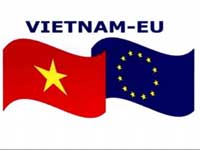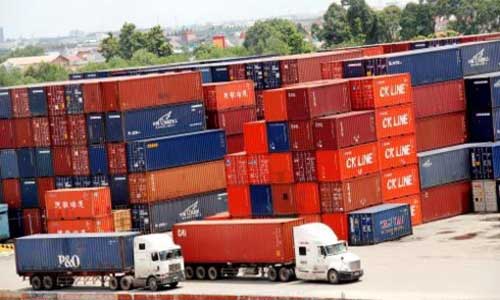"If everything goes well, Vietnam and the EU are set to agree to and ratify a wide-ranging free trade pact, known as the EU-Vietnam Free Trade Agreement, or EVFTA, by early 2018. The agreement was first envisaged in 2012 and once enacted, it is expected to accelerate trade between Vietnam and individual EU states. According to recent developments, the timeframe could be delayed, due to a ruling that each EU member state must individually agree to the deal. Vietnamese Prime Minister Nguyen Xuan Phuc’s recent visit to Germany was aimed to expedite the deal’s enactment."

If everything goes well, Vietnam and the EU are set to agree to and ratify a wide-ranging free trade pact, known as the EU-Vietnam Free Trade Agreement, or EVFTA, by early 2018. The agreement was first envisaged in 2012 and once enacted, it is expected to accelerate trade between Vietnam and individual EU states. According to recent developments, the timeframe could be delayed, due to a ruling that each EU member state must individually agree to the deal. Vietnamese Prime Minister Nguyen Xuan Phuc’s recent visit to Germany was aimed to expedite the deal’s enactment.
For Vietnam EVFTA could work well

Germany is Vietnam’s largest European trading partner; the Netherlands is its second. It is estimated that Germany receives more than 20 per cent of all Vietnamese exports to Europe, with bilateral trade worth almost $9 billion last year. The Netherlands, meanwhile, is the largest European investor in Vietnam with $7.7 billion in total committed capital. Trade between the two nations was worth $6.7 billion in 2016.
For Vietnam, EVFTA is the next best thing after Trans-Pacific Partnership (TPP), a monumental free-trade agreement between 12 Pacific Rim nations, including Vietnam, that US President Donald Trump withdrew from on his first day in office, effectively killing the deal. Vietnam was set to be one of the pact’s biggest beneficiaries. After America, Europe is Vietnam’s largest export market, which readily purchases Vietnamese-made electrical equipment, footwear and garments. In 2006, trade between the EU and Vietnam was worth a paltry $10 billion. A decade later, it has grown to $48 billion.
Experts say, uniformity of goods and stability in supply chains will need to be maintained. Agricultural firms, for example, will have to adapt to the EU’s strict ‘rules on origins’ requirements. Electrical manufacturers, meanwhile, will have to deal with the stringent copyright laws that the EVFTA enforces.
With the hope that EVFTA will boost foreign investment from Europe, the Vietnamese government is set to make the business climate friendlier for foreign companies. Vietnam jumped nine places in the World Bank’s latest ease of doing business ranking. In Europe, Phuc repeatedly spoke about the Paris climate accord, a major anti-climate change initiative signed last year, and asked European partners to help in Vietnam’s push for renewable energy.
Vietnam believes European investors can use the country as a springboard for expanding into the rest of the region. Speaking in the Netherlands, Phuc said EVFTA will allow the EU and the Association of Southeast Asian Nations (Asean) to ‘forge a deep and comprehensive economic connection’. The EU does not currently have a free trade agreement with any Southeast Asian country. While the EU-Singapore Free Trade Agreement (ESFTA) was agreed in 2014, analysts believe it will be ratified later than EVFTA. For the EU, EVFTA is a first step towards a possible free trade agreement with Asean.
Unlike TPP, the EVFTA does not come with any requirements for more political liberalism. Under the TPP, the Vietnamese government would need to allow independent trade unions to operate, an opening that no doubt made the authoritarian regime nervous. EVFTA mandates that EU companies must able to bid for public procurement tenders under the ‘same conditions’ as Vietnamese companies. Some hope this will force the government to curb rampant corruption in state contracts, as well as speed the privatisation of Vietnam’s many cash-hemorrhaging state-owned enterprises.












